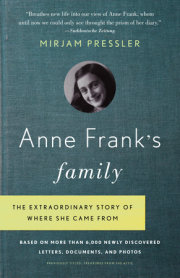Sils-Maria, in the Upper Engadine valley in Switzerland—a summer day, 1935. A slim, well-dressed man leaves Hotel Waldhaus, where he has met with an executive of the Pomosin company to report on the progress of their Amsterdam office. The man walks briskly up the road that runs right through the middle of the forest and in a few minutes reaches Villa Laret.
As he steps out from between the trees, it lies before him, in the middle of a parklike field filled with trees, more like a little castle than a villa. The windows are so clean and scrubbed that they flash in the sun.
The man walks up the wide, well-raked gravel road. He smiles when he catches sight of the swing hanging between two tall trees—a wide platform with a railing, big enough to comfortably fit a table and chairs. Two children are jumping up and down on the platform at the moment, making it start to swing. They are laughing and screaming. Two dachshunds hop around under the swing, yapping excitedly, but no matter how hard they try, they can’t manage to jump onto the swing; sometimes a dog falls onto its back in its failed attempt and flails around kicking its short legs until it turns right side up, then it starts trying again to jump up onto the swing. The children double over with laughter. The boy is about ten years old, the girl six.
“Not so loud!” the man shouts at the children.
They both stop for a moment. “Daddy, do you know what Auntie O. said this morning?” the girl screams. He steps closer and shakes his head. “Yesterday she asked her maid where her washcloth was, in French of course, and then she wanted Aunt Leni to tell her the German word for it. ‘
Waschlappen,’ Aunt Leni said. And then this morning, she said to her maid: ‘Where is my
wasch-lapin?’ ” The children giggled. “Get it, Daddy? She asked where her wash-rabbit was. Isn’t that funny?”
He nods. “Yes, that really is funny. But don’t make so much noise, so you don’t disturb all the ladies and gentlemen.”
They both nod. Then they take each other’s hands and start playing again, only the slightest bit quieter than before. The children are Buddy Elias and his cousin Anne Frank, and the man is Otto Frank, taking a holiday with his younger daughter at Villa Laret.
About a dozen ladies and gentlemen are sitting on the terrace, at tables covered with porcelain cups and dishes, the ladies with broad-brimmed hats and parasols. The gentlemen, who presumably do not dare to take off their jackets despite the hot weather, are wearing straw summer hats. In any case, the heat is more bearable here, in the middle of the forest, than up on the treeless mountain slopes.
Next to the wide double doors that lead to the salon, two maids with little white aprons and matching white lace caps are standing next to the serving cart that holds the tea and coffee pots and plates loaded with petits fours and cakes, ready to hurry over and serve any guest who signals for them.
Otto Frank walks closer. When the lady of the house sees him and waves at him, he takes off his hat and makes a bow.
The lady of the house is Olga Spitzer née Wolfsohn, a French cousin of Leni Elias and Otto Frank. Every summer she spends a few weeks at her villa in Sils-Maria, a large house with nineteen bedrooms, and she always invites guests to join her. Leni and her mother, Alice Frank, are usually among them, since the family connections are so close. This year Otto has come too from Amsterdam, with his daughter Anne but without his wife, Edith, who went with Margot, the older daughter, to see Edith’s mother in Aachen.
Olga Spitzer offers her cousin Otto her hand, and he bends down to kiss it. Then he greets his mother, Alice, and sister, Leni, with affectionate kisses on the cheek before sitting down at their table.
“Did the meeting go well?” Leni asks. In French, of course, since it would be rude to speak German in front of Olga Spitzer, who understands just a few words of the language.
Otto Frank nods. “Yes, very well. It is much easier to do business with someone when he is on vacation. He agreed to everything I suggested.”
Meanwhile, the children have come closer, curious. But the adult conversation does not interest them. They each grab a little cake.
“What should we do now?” Buddy asks, chewing.
“I know,” Anne says, and she pulls her cousin into the house, through the salon and the hall, up the wide staircase, and into their grandmother Alice’s room. “You promised,” she says, and points to the armoire. When Buddy violently shakes his head, she insists: “You said you wouldn’t chicken out.”
Buddy shrugs his shoulders. He knows that there’s no point in trying to defend himself. When Anne gets something into her head, she doesn’t let go of the idea very easily. And the fact is, he did lose the bet: she had dared to clamber up the tree after all, get a bird’s egg from its nest, and come down with the egg in the pocket of her skirt, without breaking it. Then, despite his warning, she climbed back up and put the egg back again.
“Come on, do it,” Anne says. She sits down in the armchair and tucks her legs under her.
Buddy wipes his sticky hands on his pants, hesitantly opens the armoire, and takes out a black dress. His grandmother Alice always wears only black dresses. This one has a white lace insert. He pulls it over his shirt and pants, takes a shawl, winds it tight around his waist, and then stuffs two small sofa pillows down the lace neck of the dress. Anne giggles with recognition. He looks at himself in the big mirror next to the armoire. The game is starting to be fun for him too.
He takes a hat with a bouquet of flowers on it out of a hatbox, puts it on, and stands in front of the mirror plucking at the veil until he has it hanging rakishly over one eye. The shoes with the high heels are too big, so he stuffs handkerchiefs into the toes and then prances around in front of the gleeful Anne, who laughs so loud that a maid comes in to see what is going on. The girl, quite young herself, applauds. Buddy, inspired by the effect he is having, lets himself be carried away by the game and starts making even broader gestures—elegantly pursing his lips, jutting out his pinkie and bringing an imaginary teacup to his mouth, then wiping off his pursed lips with an equally imaginary napkin. Then he offers Anne his hand, exactly as elegant and refined as Olga Spitzer when she had given Otto Frank her hand earlier, and Anne gives it a noisy wet kiss.
“Come on, go downstairs and show everyone,” she demands, but that is too much for Buddy. He doesn’t dare to in this distinguished house. Back home in Basel he would have done it just like that. He takes off the clothes, and the maid puts everything back into the armoire where it belongs. She takes the handkerchiefs he had stuffed into the shoes, to wash and iron them.
“What should we do now?” Buddy asks.
“Hide-and-seek,” Anne suggests, even though it’s a little boring with only two people. But they have thought up some new rules: the seeker has to wait longer, and if he doesn’t find the hider, then he loses and has to pay a penalty, for example, giving the winner his dessert.
They run out through the garden to the forest. “You’re it,” Anne says. “I was it yesterday.”
Buddy agrees. He crouches down under a tree and hides his face in his arms.
Anne doesn’t run far—she already knows where she’ll hide. During the game yesterday, she discovered a little cavity in the hillside, maybe an abandoned fox hole. She tears off a few branches, crawls into the opening, and pulls the branches over the entrance. Soon she hears Buddy shout that he’s ready. He goes past her more than once, but of course he doesn’t see her. She knew that this hiding place would be perfect. Hopefully, it really is abandoned; hopefully, a fox won’t come and bite her in the behind. Or is it really a fox hole? Maybe it’s a rabbit hole, for a
lapin? She suppresses her laughter as she remembers what Auntie O. had said that morning. Rabbits don’t bite, at least she had never heard of anyone being bitten by a rabbit, but foxes have sharp noses and sharp teeth.
Buddy, meanwhile, has gotten quite nervous. Of course he can’t find Anne, she has a special talent for hiding. But eventually it’s time for her to come out. “I give up!” he shouts. “Anne, come out!” She doesn’t appear, and he shouts louder and louder, runs faster and faster. What if she’s lost? What if a strange man found her and took her? How could he explain to his mother, his grandmother, and Uncle Otto that it wasn’t his fault? He can already hear his mother say: But Buddy, you’re much older than she is, it’s up to you to be more careful.
He is desperate and close to tears when suddenly she is standing next to him. “I want your dessert when we have ice cream,” she says.
Buddy would rather give her a punch in the nose. Or a kiss, because he’s so relieved. But he only says: “Look at you, you’re all filthy.”
It’s true. Anne’s light summer dress is smeared with dirt, and she tries to knock off the clumps of soil, but it’s wet and the stains only get bigger. “Don’t worry,” Buddy says, plucking a few twigs out of her hair, “Alice is so happy you’re here, I’m sure she won’t yell at you for long.”
“It’s a brand-new dress,” Anne says.
They start back, a bit dejected. “I could say I fell,” Anne suggests.
“You fell on your back and fell again on your front?” Buddy asks. He feels sorry for his cousin.
But in the end it’s not so bad. “Look at you!” Alice cries, shocked, when she sees Anne, and Otto asks if she’s hurt herself. And Leni goes after Buddy for not looking after his little cousin better. Buddy stands there completely flabbergasted and turns red under the curious gaze of all the guests.
Olga Spitzer, Auntie O., saves the situation by calling her maid and telling her to clean the girl.
“But not with the wash-fox!” Buddy says. “Use the wash-
lapin.”
A couple of ladies raise their brows in surprise. But Anne smiles again.
After dinner it turns out there is ice cream for dessert. Anne empties her bowl and then shoves it over to Buddy without anyone else noticing, and he fills it up again with his. Then he sighs, but only very quietly, so that no one will notice that either.
The grown-ups are talking about a concert that will happen tomorrow, in the house. The Trio di Trieste will perform. Concerts take place here all the time; Olga Spitzer loves music and is rich enough to pay for private concerts for herself and her guests. Leni said once that no one speaks of money in this house, that the word does not exist in Olga’s vocabulary, and that that in itself is the best proof of Olga’s wealth.
The sun goes down behind the mountains. The ladies and gentlemen return to the salon, the children are sent to bed, and in the distance the bells toll the hours of the night.
Copyright © 2009 by Mirjam Pressler and Gertrude Elias. Translation copyright © 2011 by Damion Searls. All rights reserved. No part of this excerpt may be reproduced or reprinted without permission in writing from the publisher.











